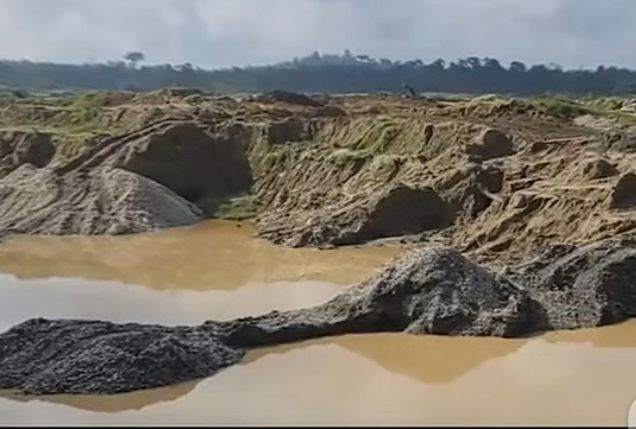By Alex Ababio
Accra, Ghana —
From forest reserves stripped bare to rivers stained the color of rust, illegal gold mining — locally known as galamsey — continues to grip Ghana’s natural resources in a chokehold. Despite years of policies and police raids, the fight to end galamsey is far from over. Now, under mounting international and local pressure, Chinese Ambassador Tong Defa has taken an unprecedented step: urging his compatriots to obey Ghanaian laws and stay clear of illegal mining operations that fuel this environmental and humanitarian disaster.
In a recent briefing at his residence in Accra, Mr. Defa spoke bluntly.
“We support the rule of law. Anyone — regardless of nationality — who engages in illegal mining must face full legal consequences,” he said. The Ambassador acknowledged the scale of destruction, joining local calls to hold Chinese nationals complicit in galamsey to account.
A Grim Reality
Illegal gold mining has shattered ecosystems across Ghana. According to a 2023 report from Ghana’s Ministry of Lands and Natural Resources, over 60% of the country’s major river bodies — including the Ankobra, Pra, and Birim — have suffered contamination due to galamsey-related chemicals such as mercury and cyanide.
“The scale is frightening,” noted Prof. Ernest Adu-Kumi, an environmental scientist at the University of Ghana. “Mercury pollution is seeping into our food chain and water supplies, posing serious health threats. Some estimates show a 400% rise in kidney ailments in communities near illegal mining sites.”
The impact on agriculture has been equally devastating. Cocoa farms and vegetable plots have been sold to illegal miners as poverty and unemployment drive local youth into the illicit trade.
“My farm was once full of cocoa,” recounts Kojo Mensah, a farmer from Obuasi who lost most of his three-acre land to galamsey operators last year. “Now I buy water for my family and my crops. This is what desperation looks like.”
Tougher Laws, Slower Progress
While President Nana Akufo-Addo’s administration passed stricter laws under Act 995 (2019) — allowing for a minimum 15-year sentence for Ghanaians and up to 20 years for foreigners — enforcement remains an uphill battle. Ghana’s Attorney-General, Godfred Yeboah Dame, confirmed at the 2024 Bar Conference that more than 140 galamsey cases involving 850 accused persons are being prosecuted across several regions.
“Since August 2021, our courts have convicted 76 offenders — including 18 foreigners,” he reported. Among the most high-profile is En Huang (Aisha Huang), dubbed the “Galamsey Queen,” who received a sentence of 4.5 years on December 4, 2023, after years of illegal operations.
China’s Balancing Act
For its part, China has a vested interest in maintaining its reputation as a responsible trade partner.
“In 2018, President Xi Jinping personally called on President Akufo-Addo to prosecute Chinese nationals who breach Ghana’s laws,” noted Ambassador Defa. However, civil society watchdogs argue that rhetoric alone isn’t enough.
“Diplomatic pressure must translate into tangible action,” said Nana Adom, a researcher at the Centre for Democratic Development, Ghana (CDD-Ghana). “More effective cooperation — including sharing intelligence — is key.”
Community Calls for Action
More and more organizations, including the Tertiary University Teachers Association of Ghana (TUTAG), have called for a state of emergency on galamsey.
“We cannot wait for future generations to clean up this mess,” said TUTAG President Solomon Nunoo in a public statement.
And it’s not just academics who are alarmed. Medical officers in galamsey hotspots like Tarkwa and Dunkwa-On-Offin report an uptick in waterborne illnesses, skin infections, and birth defects — many linked to unchecked pollution.
A Way Forward?
Despite the grim statistics, there is some cautious optimism. Initiatives like Ghana’s National Alternative Livelihood Program (NALP) aim to offer ex-galamsey workers alternative income sources. And a 2024 UNDP report on Sustainable Mining in Ghana stresses the need for responsible partnerships and investments that align with the Sustainable Development Goals.
Yet the road ahead is long.
“This is a crisis that requires sustained political will,” urged lawyer Kweku Darko-Mensah, who represents several NGOs campaigning for stronger mining regulation. “We need more robust enforcement, better monitoring of forest reserves with drone technology, and meaningful community education so that people understand the true cost of illegal mining.”
The Fight Continues
As Ghana wrestles with the complex realities of galamsey, one thing is clear: the call to action must come from all sides — from Chinese nationals to local chiefs, international bodies to community leaders — to safeguard Ghana’s future.

